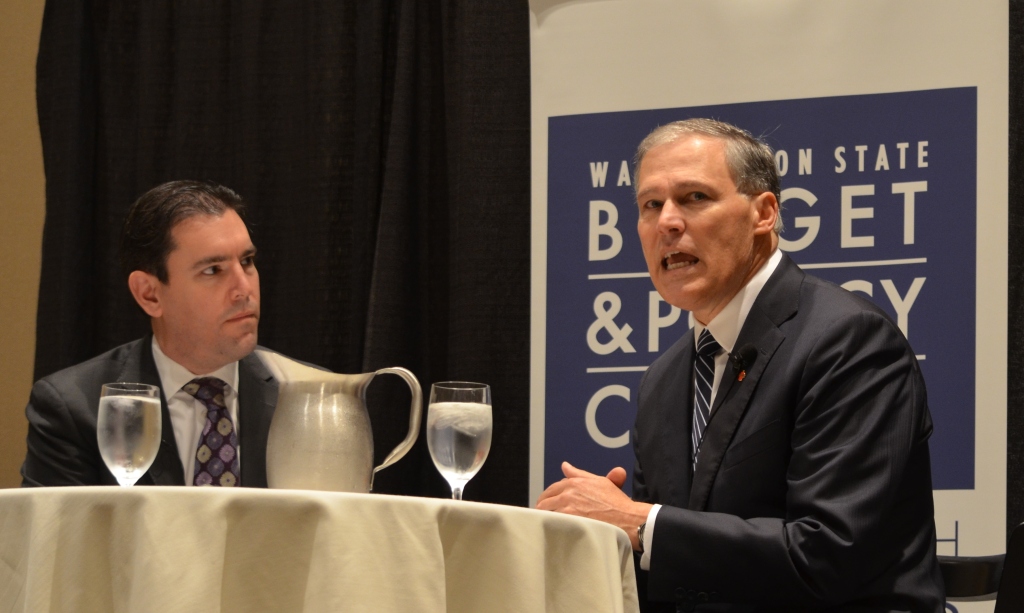Washington State Governor Jay Inslee was a featured speaker at the Budget Matters 2014 Conference held Friday December 12, 2014 in Seattle Washington at the Washington State Convention Center. Remy Turpin, the Executive Director of the Washington State Budget and Policy Center asked the Governor questions in a conversation on climate and income inequality.
Governor Inslee started out by responding as to why he was concerned about climate change and pointed out a number of reasons. One reason Inslee said was personal – it was about what kind of world we were going to leave our grandchildren and this was at risk in fundamental ways. Another reason is about economic passion – how we grow jobs. But he said it was also about health issues caused by pollutants released from burning fossil fuels. He noted that asthma rates are high along heavily traveled roads and industrial sites. Asthma rates statistically go up closer to freeways. Children are particularly vulnerable and Inslee commented on a 14 year old he recently talked with whose friends all had asthma and thought it was normal until realizing that not all children had asthma.
Inslee also noted the impacts of carbon pollution on increasing ocean acidification and its impacts on sea life. Warming associated with climate change is also increasing health risks by increased forest fires and the resultant air pollution.
Carbon pollution is particularly hard on low income people who live in lower priced homes next to freeways or in or near industrial areas releasing pollutants from burning carbon based fuels. The current economy while growing is mostly benefiting those at the top and is not working for many working families leaving them more vulnerable.
Asked about what type of legislation he was going to propose to the Washington State Legislature on dealing with carbon pollution, the Governor said that to reduce carbon pollution it was necessary to internalize the cost. The costs to the environment, peoples’ health and the economy are not currently borne by those making money off of carbon fuels but is passed back to everyone else. Governor Inslee said there were two main ways to internalize the cost and they were to pass either a carbon pollution tax or a cap and trade system that puts a fixed cost per ton of CO2 produced.
While Inslee did not say which way he was going to propose, he seemed to talk most about the benefits of a cap and trade system. British Columbia has a carbon pollution tax but Australia’s right leaning government earlier this year repealed it’s carbon tax. California three years ago moved forward on implementing its cap and trade system signed into law by former Republican Governor Arnold Schwarzenegger in 2006.
Inslee noted that eight New England states participate in a cap and trade system that is legally binding, that is limiting the number of pollution permits and that operate by a market system that auctions the permits. Cap and trade was also successfully used 20 years ago in the east to limit sulfur dioxide from coal burning.
Some 20 European countries also have a cap and trade system. While there has been some controversy over the declining permit costs to emit carbon pollution, the goals that were purposed to be met look like it is working. As noted in a New York Times post by Stig Schjolset:
“…the European Union experience suggests that designed in the right way, in line with the polluter-pays principle and with a strong compliance regime, emissions trading systems will put an effective cap on carbon emissions – a cap that can be gradually tightened as politicians sign up to more ambitious reduction targets.”
Governor Inslee warned that any attempt to put a price tag on carbon pollution would result in a full court press by the carbon extraction industries that are creating the pollution. Inslee said it was time to make ” the polluting industries rather than poor people pay.” He said the fight would be expensive and like that the tobacco industry launched- full of nonfactual and untrue statements. He said the fight has already started but that this effort will create thousands of jobs and help build infrastructure for repairing highways and education as well as help clean the air we all breathe.


